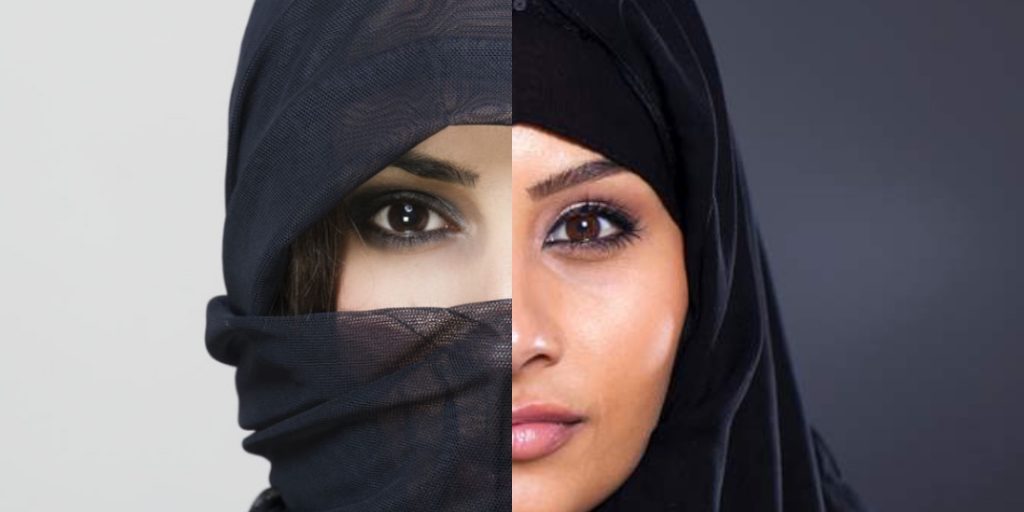Islam is a religion that glorifies the status of women, as a mother, wife and a daughter. Even in the light of the Holy Quran and Sunnah, it gives the utmost respect and importance to women.
When it talks about women, it mentions covering as well. As debatable, this topic is, the choice to cover oneself totally depends on the choice of an individual. Similarly, when Niqaab-veiling of the face, is mentioned there is a debate to as to whether if is it or is it not compulsory in Islam.
We came across a few verses that mention the covering of the face is obligatory, that is as follows.

“O Prophet! Tell thy wives and daughters, and the believing women, that they should cast their outer garments over their persons (when abroad): that is most convenient, that they should be known (as such) and not molested. And Allah is Oft-Forgiving, Most Merciful.”
Qur’an 33:59
According to Imam Abul ala Mawdudi-a scholar, ‘cast their outer garment’ is similar to the Arabic word for ‘draw together’, hence these verses refer to the covering of the entire body including the face.

And a hadith,
“The Messenger of God, may the peace and blessings of God be upon him, used to offer the Fajr prayer and some believing women covered with their veiling sheets used to attend the Fajr prayer with him and then they would return to their homes unrecognized”
According to this Hadith, scholars hold the view that it refers to ‘some women’ that means that believing women covered themselves so that they could return unrecognized on their way back from early morning prayers.
And these verses,
Narrated ‘Aisha (wife of Prophet Muhammad), Bukhari
“…And when ye ask (the Prophet’s wives) for anything ye want, ask them from before a screen: that makes for greater purity for your hearts and for theirs” Qur’an 33:53
Some scholars believe that the veiling of the face was obligatory only for the wives of the prophet as they had their own level of special respect and status, and it is not an obligation for other women as stated in this verse below,

“O Wives of the Prophet! You are not like any of the other women.”
Qur’an 33:32
According to some school of thoughts and scholars, they believe that Niqab is not obligatory citing different Hadith and verses from the Holy Quran,
“Say to the believing men that they should lower their gaze and guard their modesty: that will make for greater purity for them: And Allah is well acquainted with all that they do. And say to the believing women that they should lower their gaze and guard their modesty; that they should not display their beauty and ornaments except what (must ordinarily) appear thereof…
”Qur’an 24:30-31“
According to this Hadith, scholars state that ‘what is apparent of’ refers to hand and feet and not the veiling of the face. Most scholars, also argue that while performing Umrah and Hajj women are not allowed to cover their faces so if it was an obligatory it would have been ‘farz‘ during Hajj or Umrah.
Another Hadith,

Abdullah bin Abbas reports that the Prophet was riding a camel with Al-Fadhl, Abdullah’s brother, behind him. A beautiful woman came to ask the Prophet about the Hajj of her father. Al Fadhl began to stare at her; her beauty impressed him a lot. The Prophet (peace be upon him) having noticed this while Al Fadhl was busy looking, put his hand behind and turned his face away from her hither and thither as she went along with them. Al-Abbas said to the Prophet, “you are twisting the neck of your nephew!” The Prophet replied, “I noticed that both the boy and the girl were young; I feared that Satan may intervene” – Tirmidhi and Bukhari
Scholars in the light of this Hadith argue Niqaab wasn’t obligatory during that time as the Holy Prophet (p.b.u.h) did not command that women cover their face instead he turned his nephew’s neck.
However, taking the debate of obligation vs recommendation it is advisable that women especially in the West, don’t veil their faces where there are chances that they might be in danger or harassed.
There are differences of opinion in whether Niqab is a farz or Sunnah, as a different school of thoughts has different opinions and views, and one cannot simply force one to wear the Niqab or stop them from wearing it. It depends on the level of faith that a person has and his knowledge as mentioned in the tafseer of the Holy Quran and the relevant authentic sources of ahadith.
We would like to know your thoughts, let us know in the comments below!






